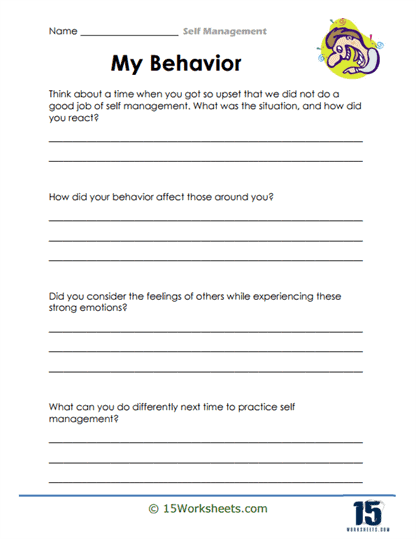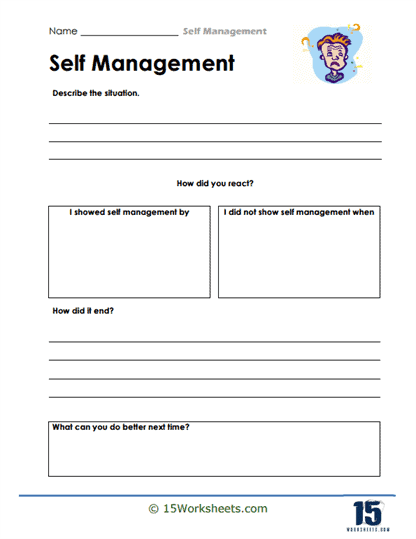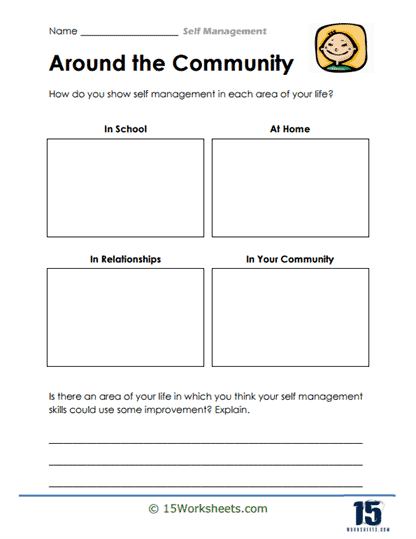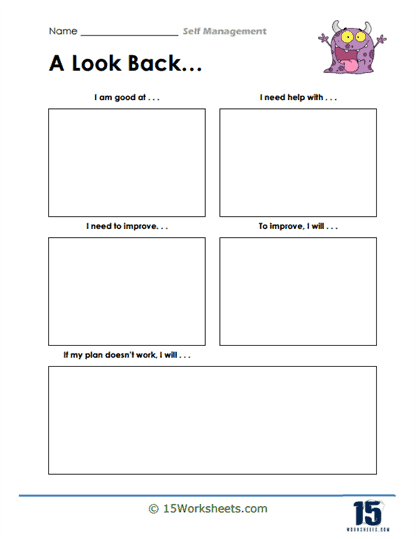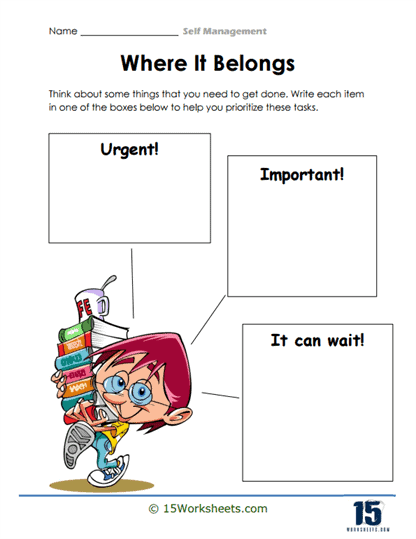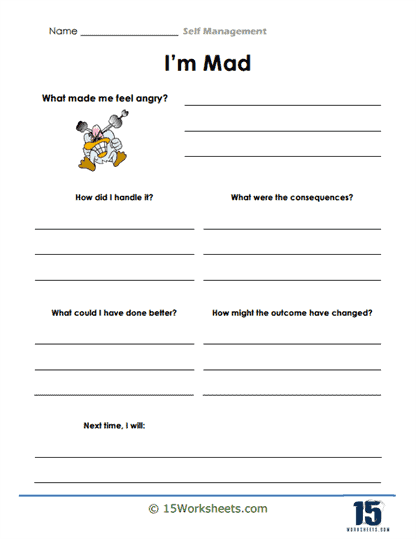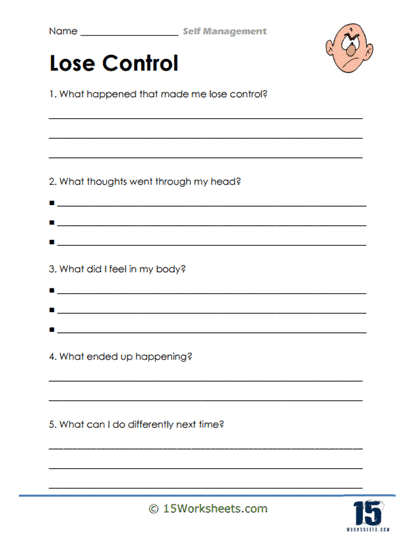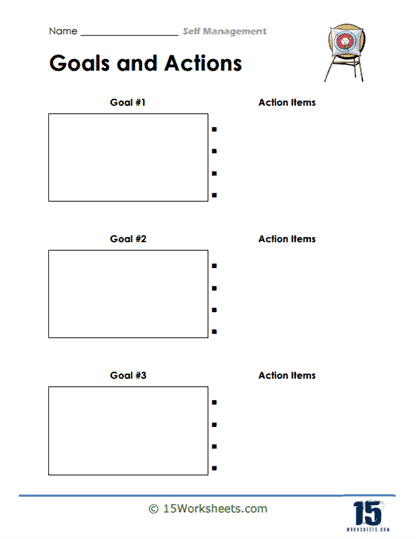Self Awareness Worksheets
All About These 15 Worksheets
These worksheets will help students, teachers, homeschoolers, and tutors foster emotional intelligence, self-management, and a deeper understanding of personal behaviors. These worksheets are particularly designed to guide individuals, especially younger students, in reflecting on their emotions, actions, and reactions in different situations. By focusing on self-awareness, these worksheets encourage individuals to recognize how their thoughts and emotions influence their behavior and to develop strategies for better self-regulation.
The exercises on self-awareness worksheets generally cover several areas, such as identifying emotions, managing stress, problem-solving, and goal-setting. For instance, the worksheets typically ask students to reflect on how they manage their emotions when they feel anger, anxiety, fear, or pressure. They may also help students recognize how their behavior affects others and how they can respond more positively in challenging situations. These types of activities are beneficial not just in academic settings but also in day-to-day life, allowing individuals to develop better coping strategies and emotional control.
The images provided show a variety of exercises that reflect the different approaches these worksheets take to help with self-awareness and self-management. In one exercise, for example, students are asked to think about how they show self-management using different parts of their body, such as their eyes, ears, mouth, and hands. This encourages them to think about their body language, listening skills, and verbal communication-all key aspects of emotional regulation. Another worksheet asks students to classify behaviors into categories such as “self-management” and “not self-management.” This exercise helps them distinguish between constructive and destructive actions, such as deep breathing versus yelling or slamming doors. Such a clear distinction can help students become more mindful of their reactions.
Another common type of exercise involves self-reflection on personal experiences and actions, such as managing stressful situations. Worksheets might prompt students to think about how they act when they are angry, anxious, or under pressure, and what strategies they can use to feel better. For example, students may be asked to fill in how they can control their actions when they experience certain emotions. This promotes not only self-awareness but also proactive emotional management.
Some worksheets focus on problem-solving skills by presenting scenarios where students need to apply self-management strategies. In one example, students are given situations, such as dealing with a disruptive classmate or handling disappointment after losing a game. They are encouraged to think through how they could respond using self-management techniques, allowing them to practice thoughtful decision-making.
Goal-setting is another essential aspect of self-awareness, and some worksheets include action plans where students can write down goals and plan the steps to achieve them. These exercises help students focus on personal development areas, such as trying new things or improving specific skills. They are taught to break down their goals into manageable steps, which supports both their self-regulation and long-term success.
Tips for Improving Your Self Awareness
1. Understanding Emotions
One of the first steps for kids to improve self-awareness is to understand their own emotions. Children often experience strong feelings like happiness, anger, or sadness, but they may not always recognize or name them. Teaching kids to identify and label their emotions helps them become more in tune with their inner world. Parents and teachers can encourage this by asking questions like, “How are you feeling right now?” or “Why do you think you feel that way?” Journaling or drawing emotions can also help younger kids express themselves. By understanding their emotional reactions, kids can start recognizing patterns in their behavior.
2. Reflecting on Behavior
Another essential aspect of self-awareness is reflecting on behavior. Kids need to recognize how their actions affect others and their environment. Encouraging reflection after events, like conflicts with friends or successes at school, helps children think about what they did well or what they could improve. A simple tool for this is asking kids reflective questions, such as, “What did you do today that made you proud?” or “What could you do differently next time?” Over time, this practice helps kids become more conscious of their behavior, building a sense of responsibility and insight into how they interact with the world.
3. Strengthening Observation Skills
To improve self-awareness, children also need to develop their observation skills. Paying attention to their thoughts, feelings, and bodily sensations in different situations can provide valuable insights into their personal experiences. Mindfulness exercises, like focusing on breathing or observing sounds around them, can help kids become more aware of the present moment. This practice encourages them to slow down and notice how they feel physically and emotionally. These skills can help them understand their reactions better and make thoughtful decisions rather than impulsive ones.
4. Building Empathy
Empathy plays a significant role in self-awareness. When children learn to see things from another person’s perspective, they not only improve their social skills but also deepen their understanding of their own feelings. For instance, discussing stories, movies, or real-life scenarios where characters experience different emotions can help kids imagine how others feel. Role-playing games and cooperative activities can also foster empathy by allowing kids to experience diverse points of view. When they understand others’ emotions, they can better connect with their own feelings and reactions.
5. Setting Personal Goals
Lastly, improving self-awareness involves setting personal goals. Kids should be encouraged to think about what they want to achieve, both short-term and long-term. Goal setting helps them reflect on their strengths and weaknesses and track their progress over time. When kids set achievable goals, such as learning a new skill or improving a relationship with a friend, they become more aware of the steps required to reach those goals. This process helps them gain a sense of control over their actions and learn from their experiences, which ultimately strengthens their self-awareness.







